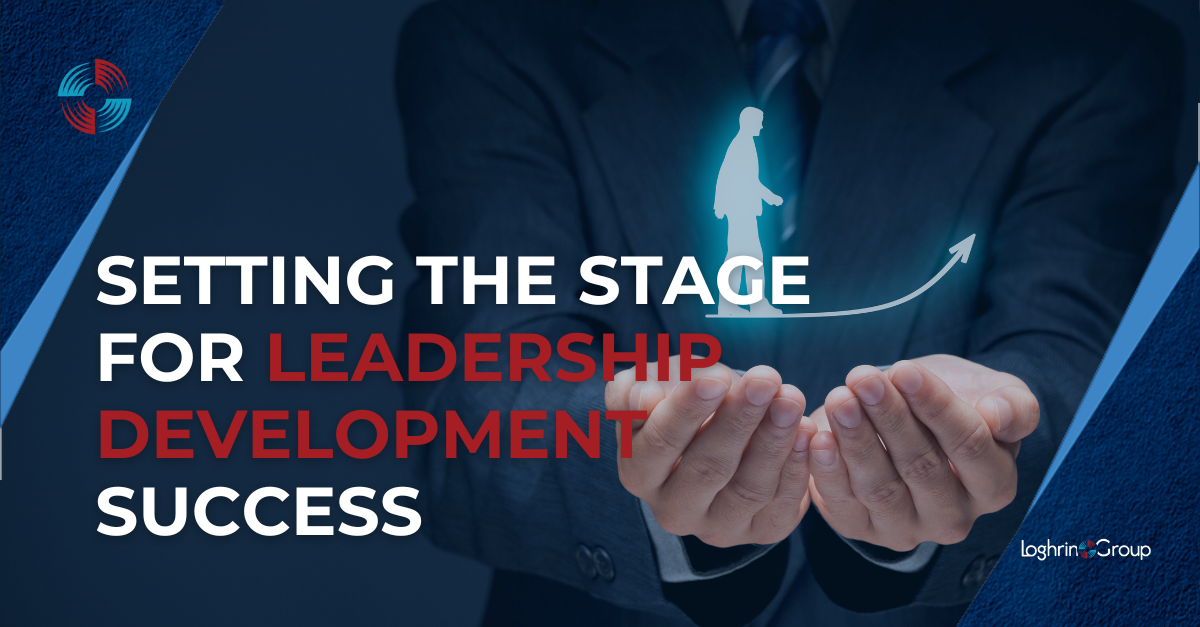Organizations face growing challenges – emerging technologies, the pressure to create efficiencies, retaining top talent, and economic uncertainty. Today’s organizations are full of leaders who want to develop and grow their skills so they can successfully navigate these challenges.
A recent research article by Gartner shows that one of the topfocuses for HR leaders in 2025 is to invest in leadership and manager development to drive long-term organizational success. However, simply offering courses is not enough. To maximize the return on investment (ROI), organizations must establish a strong foundation. While it’s not imperative to have everything in place before launching a leadership program, certain factors greatly enhance its effectiveness in driving performance and retaining top talent. These factors span across three levels: executive leadership, human resources, and frontline leaders.
Executive Leadership: Setting the Vision and Commitment
Senior leadership plays a crucial role in shaping the environment for leadership development. Their involvement and commitment set the tone for the rest of the organization. Key actions include:
- Establishing a Clear Vision: A well-defined organizational vision provides direction for leadership development efforts, ensuring alignment with broader business goals.
- Defining the Desired Culture: Leadership programs should reinforce the values and behaviours that define the organization’s culture.
- Believing in the Impact: Executives must genuinely support the development process, reinforcing its value through visibly championing the leadership development initiatives.
- Willingness to Invest: Leadership growth requires resources—time, funding, and effort—to produce sustainable results.
- Maintaining Realistic Expectations: Leadership development is an ongoing journey, not a one-time event. Success requires patience and consistent reinforcement after the training.
Human Resources: Structuring and Supporting the Program
HR departments are instrumental in designing and facilitating effective leadership initiatives. Their role includes:
- Assessing Audience Readiness: Understanding whether participants are open or resistant to leadership development helps tailor approaches that drive engagement.
- Involving Participants Early: Gaining input from potential leaders fosters buy-in and increases program relevance.
- Customizing Programs to Fit Organizational Needs: While many leadership skills are universal, tailoring the Leadership development to the company’s vision, culture, and business objectives will increase leaders’ ability to apply their new skills.
- Providing Tools for Continuous Learning: Workshops, mentorships, and coaching should be supplemented with ongoing learning opportunities to sustain growth.
- Measuring and Communicating Impact: Establishing metrics and success indicators helps demonstrate the value of leadership initiatives.
People Leaders: Engaging in the Process
Frontline and mid-level leaders are both participants and facilitators of leadership development. Their engagement determines how effectively the learning translates into day-to-day business operations. They should:
- Embrace Development as a Continuous Process: Viewing leadership growth as ongoing ensures commitment beyond initial workshops.
- Apply Learnings in Real-Time: Leaders should integrate new skills into daily work, reinforcing behaviours that drive cultural and business success.
- Encourage Team Participation: Cultivating a leadership mindset within teams helps extend the impact beyond individuals.
- Provide Feedback to HR and Executives: Leaders on the ground offer valuable insights on program effectiveness and areas for improvement.
Conclusion
A successful leadership development program requires collaboration at all levels. Executives provide vision and commitment, HR structures and support the initiative, and frontline leaders actively engage and apply learnings. By fostering a culture of continuous growth and ensuring alignment with business goals, organizations can optimize their leadership development investments and drive sustainable success.
To help organizations build stronger leaders and more resilient teams, Loghrin Group offers a variety of leadership and team development programs designed to drive real impact. Explore our full catalogue of workshops and programs to find the right fit for your team.
Meet The Authors

Jennifer Deane is the Principal of Jennifer Deane Coaching and has partnered with Loghrin Group since August of 2021. She completed her BA in Sociology from Western University in 1997, achieved the Certified Professional Co-Active Coach designation from The Coaches Training Institute in 2002, and earned the Professional Certified Coach designation from the International Coach Federation in 2016. She has over 20 years of experience bringing out the best in leaders and teams through coaching and targeted training and development. Jennifer lives, works, and plays in North Vancouver, Canada with her husband, two daughters, and her family dog.

Matt MacEachern is a leadership expert, organizational development consultant, certified coach, and founder of Lidera Consulting and Loghrin Group partner for more than three years. He’s been guiding leaders and people to be and feel their best for over 25 years. Matt is no stranger to embracing change or facing challenges. Whether climbing the highest peaks on several continents, running a marathon in Antarctica, completing an Ironman, or raising a son, he knows what it is like to face adversity, and come through the other end. He lives in Vancouver, Canada and continues to pursue his passion for seeking adventure and inspiring hope in everyone he meets.
The article is based on best practices and widely accepted principles in leadership development. However, if you need specific sources, here are some reputable references that align with the content:
Center for Creative Leadership (CCL) – Research on leadership development effectiveness
Harvard Business Review (HBR) – Articles on leadership training ROI and culture development
Society for Human Resource Management (SHRM) – Guidelines for HR’s role in leadership development
McKinsey & Company – Studies on executive leadership and business performance
Deloitte Insights – Reports on learning and development strategies
Gartner – The Top Priorities for HR Leaders in 2025

